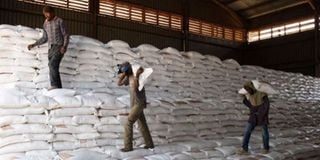Premium
Ruto's subsidised fertiliser farmers do not want

Workers arrange bags of Urea fertiliser after offloading them from train wagons at the National Cereals and Produce Board depot in Elburgon, Nakuru County, in late April.
Only one in three farmers targeted in a subsidised fertiliser programme by President William Ruto’s government took the low-cost farm input.
Latest statistics from the Ministry of Agriculture indicate that a little more than one million out of the targeted over three million farmers have purchased the low cost fertiliser, almost two months after farmers in key maize growing zones conclude this season’s planting exercise.
An estimated 1.72 million bags of planting fertiliser and 1.3 million bags of top dressing fertiliser have been purchased by farmers in the maize, potatoes, coffee, horticulture and sugar cane sub-sectors.
Some 3.2 million farmers registered for the government subsidised fertiliser targeting the food basket counties, but so far majority of them are yet to redeem their vouchers. Some farmers claimed the NPK 23:23 subsidised fertiliser is lacking in some nutrients and therefore had to blend with superior varieties such as DAP to attain the suitable components.
“It is true that some farmers were skeptical of the subsidised fertiliser going by past history where they were supplied with substandard fertiliser, translating to heavy losses,” said Kipkorir Menjo, director of Kenya Farmers Association. Farmers interviewed by ‘Nation’ said they have not experienced any challenges with the growth of their maize crop planted using the fertiliser.
“I am so far contented with the growth of the maize planted using this variety of fertiliser and those who opted not to redeem their vouchers after registering did so just out of fear,” said Jackson Kosgei, a farmer from Moiben, Uasin Gishu County.
In 2017, maize farmers in the North Rift region suffered a major blow after they were supplied with substandard fertiliser that resulted in discolouration of their crop and a poor harvest. Then, experts from Kephis and Kalro conducted analysis on soil, crop and fertiliser samples which raised issues over quality of the fertilier.
In a recent report, the Ministry of Agriculture has defended the subsidised fertiliser, stating that it had been approved by the Kenya Agriculture and Livestock Research Organization (Kalro).
“Farmers were given both planting and top-dressing fertiliser based on recommendation from Kalro on both type and application formulae,” said the report.
Farmers in Uasin Gishu have redeemed 401,874 bags of fertiliser valued at Sh1.4 billion, Trans Nzoia 240,265 bags valued at Sh861 million, Nakuru 213,218 bags estimated at Sh746.8 million, while farmers in Nandi and Nakuru counties have purchased 109,218 and 108,323 bags of fertiliser valued at Sh382.2 million and 379.4 million respectively.
The country requires about 650,000 tonnes of fertiliser annually, but high cost of the farm iputs has locked out most farmers, leading to low yield. The National Treasury has allocated Sh49.8 billion for food security programmes in the budget for the financial year 2023/2024,. In the current budget, Sh5 billion has been allocated for distribution of subsidised fertiliser to thousands of farmers ahead of the short rains season in October.





